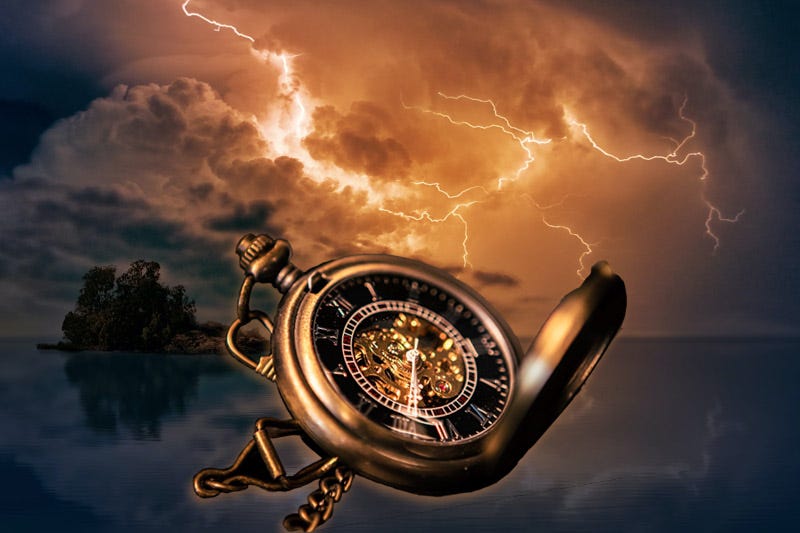Another Sci-fi Fave of Mine
Quick! Tell me a story before my coffee gets cold...

Time Travel Enigmas
There are so many books, movies, and shows in the time travel niche of sci-fi these days, and the writing and story weaving ranges from amazing to mediocre to painful. I'm not a huge time travel fan, but I often find myself buying and reading them, watching them.
Some of them are a lot of fun.
Here are the strengths I look for:
Time travel "Science". Some authors tackle the how, the science-y stuff, in the hopes of making their take on it sound reasonable. It can be interesting even when their people or story are lackluster. But some go after complex-sounding theories that get boring and convoluted, and their plots often end up in tedious knots without a satisfactory conclusion (e.g. multiple versions of the same person overlapping).
Adventure. A lot of them are basically fantasy with effortless leaping around the timeline... or multiverse or what have you. They aren't too worried about how—they love the what. What happened? How do all the intricacies fit together? There is often an appealing sense of mystery.
Drama. This kind of time travel sci-fi delves into the complexities of the human psyche, the who, and uses time travel as a refining or distorting process. The people are the mystery and what they will do or how they develop becomes central.
I can enjoy stories that are strong in only one of these aspects, and of course, I love finding ones that zero in for the win on all three. But I don't have to have excellence on all three counts to say, "This is a good book".
I've chosen two time travel series to review. Today's choice is well crafted drama with the how-to implied and more mystery than adventure.

Before the Coffee Gets Cold
What it's about
A timeless café where time travel is possible within very strict limitations and lives are changed by it.
My first impression
I was interested because it was written by a Japanese author and the confines of the premise were pretty precise. And I looked forward to entering the world of a story teller with a very different cultural background to mine—I was not disappointed.
It wasn't, as I expected at first, just a collection of short stories happening in the same place with the same starting point. There is an underlying plot that ties the place, the customers, and the staff together. Each section covers one time travel story but the mystery of the café itself progresses in the background. As soon as I finished the first book, I bought the next, and it was just as good. I'm looking forward to reading the third one which just came out.
Why I liked it
The pace is calm and steady, capturing the atmosphere of the café and a deep patience that abides there. Yet the timing of the coffee cooling adds a contrasting tug, beautifully balanced. The complexity of people and their most important relationships is central to the book. Everyone has some mistake or tragedy or loss or longing that they carry around with them. What can be accomplished in a few minutes?
I liked the threads of the mystery being pulled together, for each story, and also for the regulars and staff at the café. It gives a window into some of the inner motivations that drive people in Japan which I found appealing.
The writing is very good; the translator captured the feel of the author's style and Japanese culture. And the pacing of the storytelling is excellent. The setting is so unique that I had no desire to imitate it, something that can easily happen when I am liking a book. But here, it was captivating enough that I didn't want to interrupt my reading by imagining what I would do.
It turns out the café's is named after a famous Italian opera song, "Funiculì, Funiculà", a catchy tune about a cable car. I love that. In fact, I used to make up words to this melody to sing to my kids when they were little.
What I might change
One Amazon reviewer found fault with the sparse style of writing, but that's an unreasonable assessment. The translator did a wonderful job of capturing the cadence of Japanese prose. Another reviewer complained about the visual descriptions of what people wore and how they looked. In our American culture, physical descriptions like these would be superficial and meaningless. Not so here. They are essential because every thing he paints deepens the story. If someone's appearance deviates from the norm in Japan, that tells you something about them.
I wouldn't change a thing.
Type of read
Thoughtful, steady, drama. Sci-fi, only in the sense that some time travel is involved, with a hint of the paranormal since there is a ghost that looks fully normal.
It has the feel of live stage because every scene has the same setting, the Funiculí Funiculá Café. The drama, though, plays out visually, audibly, and also in people's minds.
Conclusion
This is a fine cognac, worth savoring and mulling over.
Now that it's in my head, I can't stop singing "Funiculí, Funiculá".




